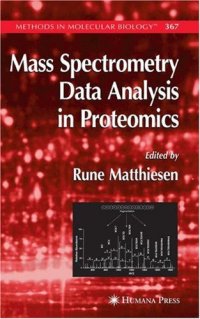
Ebook: Mass Spectrometry Data Analysis in Proteomics
- Genre: Computers // Organization and Data Processing
- Tags: Cell Biology, Bioinformatics, Biotechnology, Proteomics
- Series: Methods in Molecular Biology 367
- Year: 2007
- Publisher: Humana Press
- Edition: 1
- Language: English
- pdf
Mass Spectrometry Data Analysis in Proteomics is an in-depth guide to the theory and practice of analyzing raw mass spectrometry (MS) data in proteomics. As MS is a high throughput technique, proteomic researchers must attend carefully to the associated field of data analysis, and this volume outlines available bioinformatics programs, algorithms, and databases available for MS data analysis. General guidelines for data analysis using search engines such as Mascot, Xtandem, and VEMS are provided, with specific attention to identifying poor quality data and optimizing search parameters. Several different types of MS data are discussed, followed by a description of optimal methods for conversion of raw data into peak lists for input to search engines. Choosing the most accurate and complete databases is emphasized, and a report of available sequence databases is included. Methods for assembling expressed sequence tags (ESTs) into assembled nonredundant databases are provided, along with protocols for further processing the sequences into a format suitable for MS data. Mass Spectrometry Data Analysis in Proteomics describes publicly available applications whenever possible.
Mass Spectrometry Data Analysis in Proteomics is an in-depth guide to the theory and practice of analyzing raw mass spectrometry (MS) data in proteomics. As MS is a high throughput technique, proteomic researchers must attend carefully to the associated field of data analysis, and this volume outlines available bioinformatics programs, algorithms, and databases available for MS data analysis. General guidelines for data analysis using search engines such as Mascot, Xtandem, and VEMS are provided, with specific attention to identifying poor quality data and optimizing search parameters. Several different types of MS data are discussed, followed by a description of optimal methods for conversion of raw data into peak lists for input to search engines. Choosing the most accurate and complete databases is emphasized, and a report of available sequence databases is included. Methods for assembling expressed sequence tags (ESTs) into assembled nonredundant databases are provided, along with protocols for further processing the sequences into a format suitable for MS data. Mass Spectrometry Data Analysis in Proteomics describes publicly available applications whenever possible.